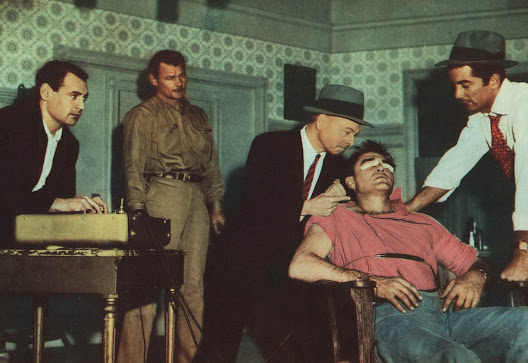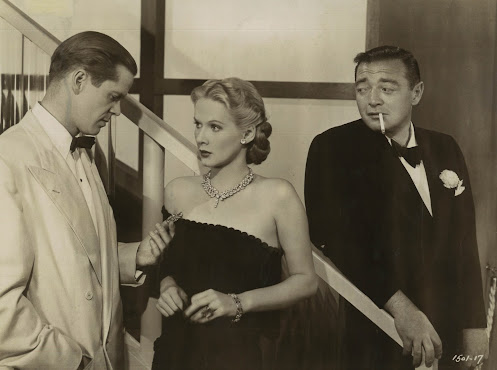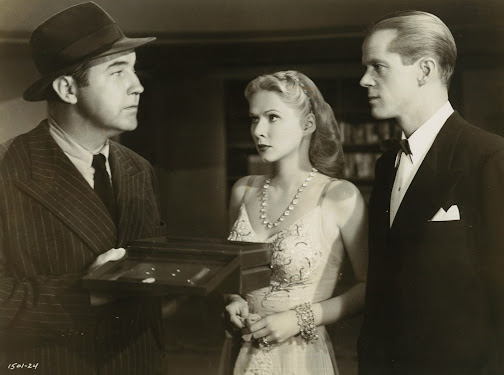Film Noir #10
Noir: The Big Operator and Black Angel
THE BIG OPERATOR (1959) --- Mickey Rooney could give great performances in repose. Let the film be rag-tag, Mick never missed. By 1959, he was shuttling between leads for B’s and support in A’s. Attitude may have held him down, as Rooney had habit of sacking agents and biting hands that fed him. Deep-resenting how he was treated since Number One time was passed, Rooney saw solace in playing hard-bark heavies where he’d push around even ones that dwarf him like Steve Cochran and Ray Danton. Conductor of twisted symphony that is The Big Operator was Albert Zugsmith, of whom it was said no one was so penurious or given so to sludge. But … if there were no Zuggy, there would likely be no Touch of Evil, or The Incredible Shrinking Man, so take medicine that is The Big Operator and like it. Any film where Steve Cochran is happy wed to Mamie Van Doren (their kid is Jay North) ranks high among my souvenirs. Cast in support can only be called inspired … where does one even begin? Mel Torme, aforesaid Danton, Leo Gordon, Jim Backus, Charles Chaplin Jr., Ray Anthony, and VAMPIRA --- caps necessary because there was but one Vampira (unless you factor in Carrol Borland or Elvira).
She is billed too as Vampira, not Maila Nurmi, and better still, plays a beatnik. Jackie Coogan is present, credited too as Dialogue Coach, and who could have brought to that job such range of experience? Coogan saw much in his life, too much to speak of for interviews perhaps, an infant of tawdriest tank stops and bad influences from parents on down. GPS addressed Jack before in terms of being cheated out of millions, lynch mob presence, and marriage to Betty Grable (what she learned from him). Most movies will assure you that unions are on the square, but Zugsmith apparently got no such directive. Rooney’s brotherhood appears to be rotten from the top down. Had Zugsmith been having union trouble? The Big Operator was distributed by MGM, done independent by Zugsmith for negative cost of $537K, scope black-and-white and on L.A. streets or the Metro backlot where needed. There came but $319K in domestic rentals, $295K foreign. Final loss was $312K. The Big Operator plus others Zugsmith did for Metro release reverted to him, all gone quick to TV. Olive has a Blu-Ray of fine quality.
BLACK ANGEL (1946) --- Universal did class mysteries during the 40’s to invite better bookings and placement at top of bills their unaccustomed place. Toward that came gifted directors like Robert Siodmak, writers to climb hill out of pulp origin, and casts to supply conviction if not glamour. Phantom Lady, then The Suspect and Scarlet Street, proved it could be done, and to a public’s liking. These had Siodmak or Fritz Lang as signatories, prior associates of Hitchcock on hand (Joan Harrison a producer), plus stories strung on crime and guilt to ensnare folks like you/me who schlep onto harm’s path. One could cast an Alan Curtis, Dan Duryea, or at further extreme Charles Laughton or Edward G. Robinson and realize how easy it was for common clay to trip up and into a gas chamber. Black Angel has a nonentity we barely meet (John Bennett) charged right off with murder, and a wife ticking down to his scheduled execution, a “good girl” (June Vincent) who won’t mind using born loser Dan Duryea to find the real killer.
Wrinkle here is that Duryea might be the killer, if unaware of the fact, complications the handiwork of source author Cornell Woolrich, who for many is sufficient reason to look at Black Angel. I like how Vincent strings Duryea along, being handsy with him and seeming to promise he’ll be successor to the husband however the case turns out, Duryea this time lovelorn rather than a cruel exploiter of women. This actor was clearly floated here for something other than villainy or weaklings. Roy William Neill directs Black Angel, having graduated from the Sherlock Holmes series, his future seeming assured for noir and like subjects had not death claimed him in 12/46 at age fifty-nine. Universal constructs a lavish nightclub set and stages most of action around it, a boost to production values and off-set to perception that Black Angel is more of “B” same. Universal really had to earn whatever first-run placement they got, offerings from them vetted thorough before “A” dates were bestowed. Black Angel was released as a nice standard DVD, then more recently a Blu-Ray from Kino.








4 Comments:
I've never been able to tolerate Mickey Rooney in comedies or even talk shows, but he's truly great in noirs, clearly digging deep for the anger seething inside.
I believe that Black Angel is out from Arrow on Blu-ray, not Kino.
Trivia: I've read that the Black Angel nightclub set was reused for some of the big band two-reelers Universal was making at the time, which undoubtedly gave those shorts a slicker look than they usually had.
Someone once cracked, unfairly, that Universal was unable to do anything well in those days but Abbott and Costello, Sherlock Holmes and horror. Black Angel is proof that wasn't true, although Cornell Woolrich reportedly hated it.
I'm guessing it was just a coincidence that Mickey Rooney Jr passed away two days before you posted this.
Post a Comment
<< Home